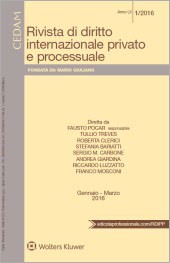Rivista di diritto internazionale privato e processuale (RDIPP) No 3/2022: Abstracts
 The third issue of 2022 of the Rivista di diritto internazionale privato e processuale (RDIPP, published by CEDAM) was just released. It features:
The third issue of 2022 of the Rivista di diritto internazionale privato e processuale (RDIPP, published by CEDAM) was just released. It features:
Giovanna Adinolfi, Professor at the University Milan, States’ Economic Measures to Counter Cyberattacks: Disentangling Their (Il)Legitimacy under International Law
The present contribution draws the attention on measures adopted by States to tackle actual or potential cross-border cyberattacks and that may have an impact on international commercial transactions. With a look to the more recent practice, the distinction is proposed between response measures (addressed against those held responsible for cyber operations that have caused an injury to the target State) and anticipatory or preventive measures (intended to prevent cyberattacks). Against this backdrop, the issue is addressed as to whether both types of measures represent international unlawful acts which find a justification within the international legal order.
Bruno Barel, Associate Professor at the University of Padua, Le notificazioni nello spazio giuridico europeo dopo il regolamento (UE) 2020/1784 (Service of Documents in the European Judicial Area after Regulation (EU) 2020/1784) [in Italian]
The second recast of the uniform rules on the service of judicial and extrajudicial documents in civil or commercial matters introduced three innovative elements of particular relevance to the original framework, that dates back to the year 2000 (and which had already been subjected to recasting in 2007). Two of these novel provisions relate to the technological evolution of remote communications, and they consist of the institution of a common IT system for the telematic transmission of acts and documents between national authorities and of the – albeit timid and prudent – opening to direct forms of service by electronic means between individuals, thus surpassing the mediation of authorities. The third – and equally careful – novel provision attempts to reinforce the assistance between the authorities of different Member States aimed at identifying the address of the person to be served. Moreover, the most innovative part of the regulation will be fully operational only in 2025, in expectation of the full development of the decentralised IT system.
The following comments are also featured:
Pietro Franzina, Professor at the Catholic University of the Sacred Heart – Milan, Il ruolo degli Incoterms nella determinazione convenzionale del luogo della consegna: note critiche sulla giurisprudenza della Cassazione (The Role of Incoterms in the Determination by Agreement of the Place of Delivery: Critical Notes on the Case Law of the Italian Court of Cassation) [in Italian]
By a recent ruling (Order No 20633 of 28 June 2022), the Italian Supreme Court addressed the issue of the role played by Incoterms in the determination of the place of delivery of the goods for the purposes of Article 7 No 1(b), of Regulation No 1215/2012 of 20 December 2012 on jurisdiction and the recognition and enforcement of judgments in civil and commercial matters. As in previous rulings on the same subject, the Supreme Court was reluctant to regard the incorporation of Incoterms into a contract as signalling the parties’ agreement on the place of delivery. Specifically, the Supreme Court dismissed the claim by the Italian seller that the contract in question had been agreed “EXW” its own premises in Italy: the Court acknowledged that the goods had in fact been picked up by a carrier hired by the buyer at the seller’s premises, but found that the parties had failed to agree “clearly” on the place of delivery, as it could not be established that the parties had unequivocally intended to make the seller’s premises the place of delivery of the goods for the purposes of jurisdiction. The paper contends that the approach of the Italian Supreme Court contradicts the principles laid down by the Court of Justice in Car Trim and Electrosteel. The approach is unpersuasive in two respects. First, the Supreme Court regards the parties’ agreement on the place of delivery as a derogation from the “general rule” whereby delivery must be understood to be due, for jurisdictional purposes, at the place of final destination of the goods (whereas, according to the Court of Justice, the latter is just a residual rule, which applies where the parties have failed to agree on the place of delivery). Secondly, the Supreme Court disregards the rules of interpretation adopted by the International Chamber of Commerce to describe the parties’ obligations under the different Incoterms, and follows, instead, its own understanding of the Incoterms concerned: actually, the Supreme Court asserted in the decision reviewed that, “as a rule”, the Incoterm EXW only relates to the allocation of the costs of transport and the transfer of risk, and has no bearing as such on the determination of jurisdiction.
Michele Grassi, Research Fellow at the University of Milan, Riconoscimento del rapporto di filiazione omogenitoriale e libertà di circolazione all’interno dell’Unione europea (Recognition of Same-Sex Parentage and Freedom of Movement within the European Union) [in Italian]
This paper aims to provide a critical analysis of the judgment rendered by the Court of Justice of the European Union in the Pancharevo case, where the Court was confronted with the sensitive issue of same-sex parenthood and its recognition in the context of free movement rights within the Union. The investigation focuses on the functional approach adopted by the Court of Justice in the application of the mutual recognition principle, and its possible implications on the recognition of same-sex parenthood for wider purposes, not directly linked to the exercise of free movement rights
Finally, this issue features the following book review by Francesca C. Villata, Professor at the University of Milan: Jason Grant ALLEN, Peter HUNN (eds.), Smart Legal Contracts. Computable Law in Theory and Practice, Oxford University Press, Oxford, 2022, pp. XIV-513.


